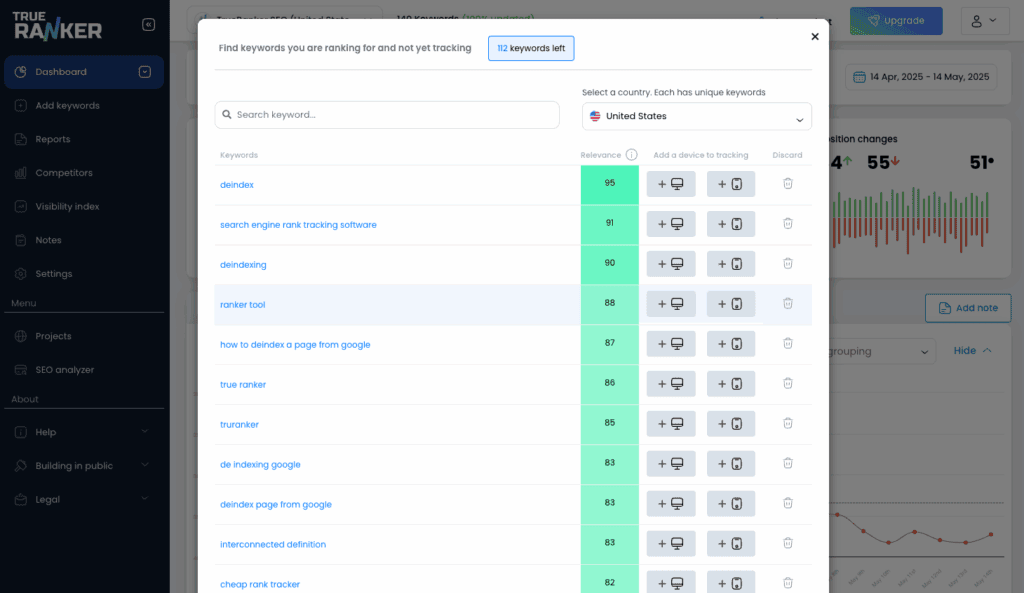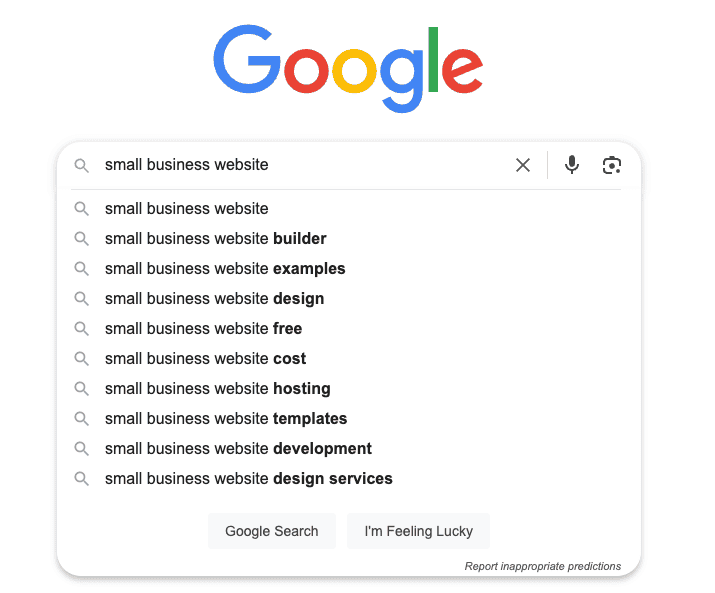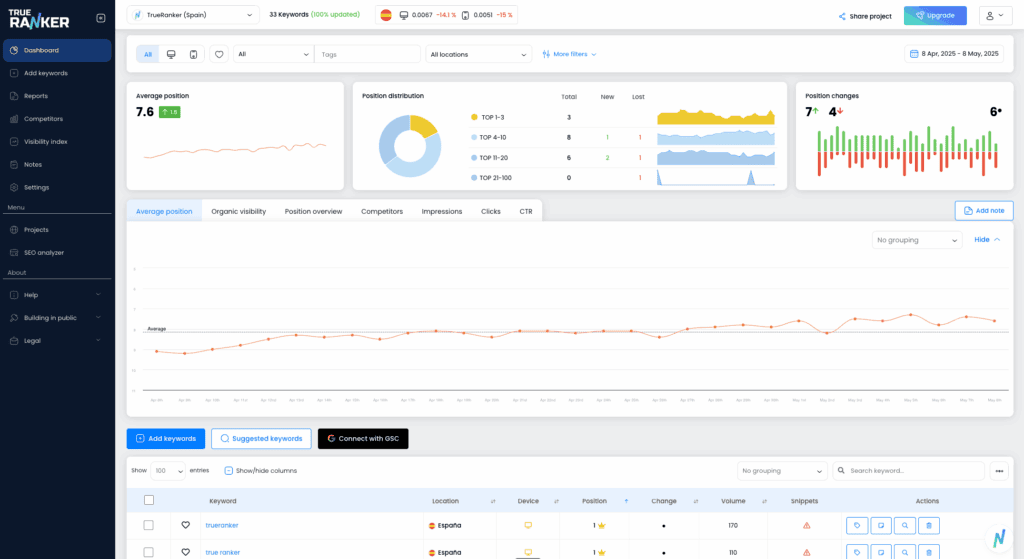Contents
ToggleWhy isn’t anyone finding your business online?
You’ve put in the work. Built a beautiful website. Crafted thoughtful content. Maybe even started blogging regularly. Then you wait… and wait… checking your analytics only to find tumbleweeds rolling through your visitor stats.
It feels like you’ve opened a store on a street with no foot traffic. Or worse, you’ve built it on a street with no address. Here’s where most small businesses get stuck: If you’re not targeting the right keywords, Google doesn’t know who to send your way. It’s that simple.
I’ve spent the last fourteen years helping businesses with their SEO, and I’ll tell you something most “experts” won’t admit: finding the right keywords isn’t rocket science. But it is the foundation of everything else you’ll do online.
Let’s break down keyword research in a way that actually makes sense, no jargon, no complicated metrics, just practical steps that work.
What exactly is keyword research? and why should I care?
Keyword research is detective work. It’s figuring out exactly what words and phrases your potential customers type into Google when they’re looking for what you offer.
Think of it this way: keywords are the bridge between what people are searching for and the content you’re providing to fill that need.
Done right, keyword research will:
- Help you understand what your audience actually wants (not what you think they want)
- Connect your business with people actively looking for your products or services
- Bring in visitors who are more likely to become customers (qualified traffic)
- Save you from wasting time creating content nobody searches for
Why This Matters: If your website isn’t optimized for the terms people are searching for, it’s like having an unlisted phone number. You might have exactly what someone needs, but they’ll never find you.
Here’s my hot take: Most businesses make keyword research way more complicated than it needs to be. They get lost in advanced metrics and competitive analysis when they should be focusing on the basics first.
How do I discover what people are actually searching for?
Start where all good marketing starts, with your customers.
Begin with a brainstorming session:
- Write down questions customers frequently ask you
- List the problems your product or service solves
- Note the language customers use (not industry jargon)
- Think about seasonal trends or timely issues in your industry
When we launched TrueRanker, we made the classic mistake of using technical SEO terminology in our content, terms we understood but our target audience of small business owners rarely searched for. Our traffic was nonexistent until we adjusted our approach.
Use these free tools to expand your list:
- Google Autocomplete: Start typing a relevant phrase and see what Google suggests
- “People also ask” boxes: Gold mines for related questions
- AnswerThePublic: Visual maps of questions people ask about any topic
- Google Trends: See if keywords are growing or declining in popularity
SEO Simplified: These initial terms are called “seed keywords.” Think of them as the seeds you’ll plant that will grow into your keyword strategy.
Pro tip: Keep a running document of customer questions and the exact language they use when describing their problems. This is keyword research gold that most businesses completely overlook.
What tools can help me find better keywords?
You don’t need a $100/month subscription to start finding good keywords. Let’s be practical about this.
Free and low-cost options:
TrueRanker’s keyword suggestions: While not a full research suite, our tool provides actionable keyword ideas based on what you’re already tracking

Google Search Console (if your site is already set up): Shows what terms are already bringing people to your site

Ubersuggest: Offers limited free searches with volume data
Keyword Surfer (Chrome extension): Shows search volumes right in Google results
When you’re ready to level up:
Tools like Ahrefs, SEMrush, and Moz offer more comprehensive data. But honestly, and this is something most SEO agencies won’t tell you, most small businesses can get great results using just the free tools above.
Why This Matters: Using the right tools saves you from guessing. It’s like using a map instead of wandering around hoping you’ll reach your destination.
How do I choose the right keywords from my list?
Not all keywords are created equal. The perfect keywords for your business hit the sweet spot between these three factors:
1. Relevance
Does the keyword actually match what you offer? Will visitors searching this term find what they’re looking for on your site?
2. Search Intent
This is the “why” behind a search. Are they:
- Looking for information? (“how to fix a leaky faucet”)
- Shopping around? (“best plumbers in Chicago”)
- Ready to buy? (“emergency plumber near me open now”)
3. Difficulty vs. Opportunity
Be realistic about what you can rank for. If you’re a local bakery, you probably won’t outrank Betty Crocker for “cake recipes”, but you might rank well for “custom birthday cakes in [your city].”
SEO Simplified: Look for what we call “Goldilocks keywords”, not too competitive, not too obscure, but just right for your business size and authority.
Here’s a comparison to make this clearer:
| Keyword Type | Example | Volume | Competition | Best for |
| Head Keyword | “shoes” | Very high | Extremely difficult | Big brands |
| Mid-tail Keywords | “running shoes” | High | Difficult | Established sites |
| Long-tail Keywords | “women trial running shoes for wide feet” | Low | Accesible | Small and Medium Businesses |
When we were starting out with our own content, we made a critical mistake by targeting highly competitive keywords like “SEO tools” where industry giants had already established dominance. We quickly pivoted to more specific terms like “affordable keyword rank tracker for small business,” which brought fewer but much more relevant visitors.
Different types of keywords you should know about
Understanding these keyword categories will help you create a balanced strategy:
Informational Keywords
People seeking knowledge: “how to,” “guide to,” “what is,” etc. Example: “how to choose keywords for small business”. By consistently publishing high-quality informational content, you position yourself as a reliable and authoritative resource for your target audience. This builds trust and encourages them to return to your website whenever they’re seeking more insights.
And when it’s time for them to make a purchase decision, your brand and website will already feel familia, making you a natural choice.
Commercial Investigation Keywords
People researching before purchase: “best,” “top,” “reviews,” “vs,” etc. Example: “best rank tracking tool for small business”. Commercial keywords typically reflect high buyer intent and often center around product or brand comparisons, or users seeking real-world insights. These are the types of searches people make when they’re close to making a purchasing decision.
Because of this strong intent to buy, targeting commercial keywords can drive highly qualified traffic. To capture this audience, use content formats like product or service landing pages, comparison articles, and pages that highlight testimonials or customer reviews.
Transactional Keywords
People ready to buy: “buy,” “discount,” “for sale,” “pricing,” etc. Example: “buy SEO rank tracker monthly subscription”. Transactional keywords signal strong buyer intent, making them powerful drivers of revenue. Users searching with these terms are often ready to take immediate action, whether that’s making a purchase, signing up for a demo, or requesting a free sample.
But transactional intent isn’t limited to purchases. It also includes conversion-oriented actions that move users further down the funnel. These keywords are also especially valuable in pay-per-click (PPC) campaigns, where aligning ad copy with strong intent can maximize ROI and drive measurable business results.
Navigational Keywords
Terms searchers use when they want to get to a specific page or website. They usually have a low buyer intent, but they can bring conversions to your business. “facebook link”, “pizza hut address”, etc.
How do I know if my keyword research strategy is working?
This is where tracking becomes essential: “you can’t improve what you don’t measure”.
The simplest way to track keyword performance is to:
- Record your starting positions for each target keyword
- Create or optimize content around those keywords
- Track position changes over time
- Connect ranking improvements to actual business results
TrueRanker makes this tracking process straightforward. Instead of manually checking Google (which gives personalized results that can be misleading), our rank tracker tool shows your actual rankings across different devices and locations. You’ll get alerts when rankings change significantly, so you know when to celebrate or when to make adjustments.

Why This Matters: Without tracking, you’re essentially throwing darts in the dark. Tracking helps you connect your efforts to actual results.
One of our small e-commerce clients started tracking just 15 product-related keywords. Within two months, they identified three keywords that had moved from page 3 to page 1, resulting in a 32% increase in organic product page visits. They doubled down on those successful patterns for other products and saw similar improvements.
When and how to update your keyword research strategy
Keyword research isn’t a “set it and forget it” task. Markets change. Consumer language evolves. New competitors emerge.
A good rule of thumb:
- Monthly: Check rankings and performance of current target keywords
- Quarterly: Analyze which keywords are bringing traffic and conversions
- Semi-annually: Conduct broader research to discover new opportunities
When updating, look for:
- Keywords that are improving (potential for more content)
- Keywords that are declining (may need refreshed content)
- Seasonal patterns to plan content around
- New terms appearing in your industry
Warning sign: If your rankings drop across multiple keywords simultaneously, it might indicate a technical issue or algorithm update rather than a keyword problem.
Real examples: From invisible to discoverable
Mini Case Study: Local Service Business Transformation
A small landscaping company in Barcelona was struggling to get found online. Their website mentioned “landscaping services” throughout but wasn’t ranking for any valuable terms.
After keyword research, they discovered that:
- Local customers searched for specific services like “yard cleanup Barcelona” and “lawn aeration near me”
- Seasonal terms like “fall leaf removal” had lower competition but high intent
- Questions like “how often should you mow lawn in the Mediterranean” had featured snippet opportunities
They created dedicated service pages for each main service, optimized for location-specific keywords, and started a simple blog answering common questions.
Results after 3 months of tracking in TrueRanker:
- 8 of their 12 target keywords moved to page 1
- Organic traffic increased by 46%
- Request-a-quote form submissions doubled
The owner’s feedback: “We went from invisible to showing up everywhere our potential customers were looking. The best part was that these new leads already understood our services.“
Frequently Asked Questions About Keyword Research
How many keywords should I target on each page?
Focus on one primary keyword and 2-3 closely related secondary keywords per page. Trying to target too many different keywords on a single page can dilute your focus and confuse search engines about the page’s main topic.
Is it better to focus on high-volume or low-competition keywords?
For most small businesses, moderately-searched, lower-competition keywords deliver better results than highly competitive terms. A #1 ranking for a niche keyword brings more traffic than a #50 ranking for a popular term.
How long does it take to see ranking improvements after targeting new keywords?
Typically, you can see movement within 4-8 weeks, though significant improvements often take 3-6 months. New websites may take longer. Patience and consistent monitoring are key, use TrueRanker to track progress over time rather than checking manually every day.
Should I use the exact keyword phrase repeatedly in my content?
No, search engines have evolved beyond exact-match counting. Include your keyword naturally in important places (title, headings, first paragraph, conclusion), then focus on writing comprehensive, valuable content that covers the topic thoroughly.
How do I compete with big brands for valuable keywords?
Get specific and solve particular problems. While you probably can’t outrank Amazon for “bluetooth headphones,” you might rank for “best bluetooth headphones for small ear canals” or “bluetooth headphones for outdoor workers.” Find your specific angle.
Your step-by-step keyword action plan
Ready to find the right keywords for your business? Here’s exactly what to do:
- Start with a customer-focused brainstorm session (list problems you solve, questions customers ask)
- Expand your list using free tools (Google autocomplete, People Also Ask, AnswerThePublic)
- Evaluate each keyword for relevance, intent, and competition level
- Organize keywords by topic clusters (group related terms together)
- Prioritize 5-10 keywords to focus on first (choose specific, achievable terms)
- Create or optimize content around each target keyword
- Track your rankings using TrueRanker to monitor progress
- Refine your strategy based on what’s working
Remember, keyword research isn’t about finding magical terms that automatically rank your website. It’s about understanding what your customers are searching for and creating the best possible content to meet those needs.
With TrueRanker, you can stay focused on what matters, watching your keywords climb the rankings and connecting those improvements to real business results.
